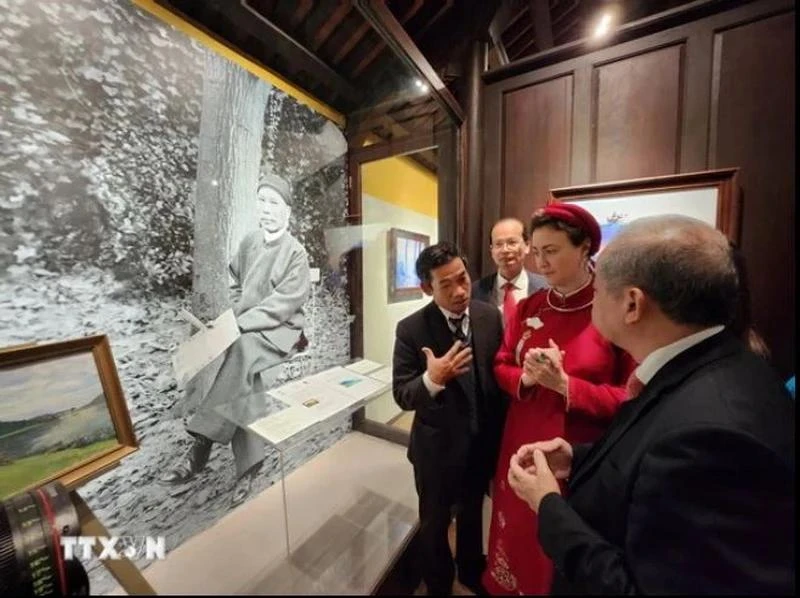
Amandine Dabat (in red), a fifth-generation descendant of King Ham Nghi, and officials of Thua Thien-Hue province visit an exhibition on the king. (Photo: VNA)
The Vietnam Fine Arts Museum is about to receive a painting titled “Hillsides in Deli Ibrahim (Algiers)” by Ham Nghi, an exiled Vietnamese king, on November 12.
Ham Nghi (1871-1944), personal name Nguyen Phuc Minh, came to the throne in 1884 and was the 8th king of the Nguyen Dynasty (1802-1945). After the Imperial City of Hue was lost in 1885, he left the capital and issued the “Can Vuong” (aid the king) edict, calling for patriots to rise up to regain independence and freedom. He was detained by the French colonialists in 1888 and exiled in Algiers, the capital of Algeria, the following year.
He lived at a villa on El Biar hill, about 12km from Algiers, and still upheld the homeland’s traditions until his death in January 1944.
During the years of exile, the king learned painting and sculpture, following the art movements of impressionism and post-impressionism. He created 91 paintings along with a number of sculptures. Many of his works became known in the art world through auctions and exhibitions in France.
The oil painting “Hillsides in Deli Ibrahim (Algiers)” was created in 1908, depicting the countryside landscape near his home in Algiers. In 1926, the work, given that title and signed “Tu Xuan”, was displayed at the Mantelet-Colette Weil gallery in Paris.
The museum said this painting will be presented by PhD in art history Amandine Dabat, a fifth-generation descendant of King Ham Nghi, with the hope that the public in Vietnam and international visitors can admire this work by the exiled emperor and artist right in his homeland.
“Hillsides in Deli Ibrahim (Algiers)” not only enriches the museum’s collection but is also a precious source of reference for researchers of Vietnam’s fine arts in the late 19th century and the early 20th century, the museum noted.
Ham Nghi was trained in fine arts by painter Marius Reynaud from 1889. He started learning sculpture from Leon Fourquet in Algiers in 1895 and from Auguste Rodin in Paris in 1899 (in three summer months every two years).
The king used pseudonym “Tu Xuan” as it was his nickname when he was small, and he also used it as his name for his entire life./.
VNA